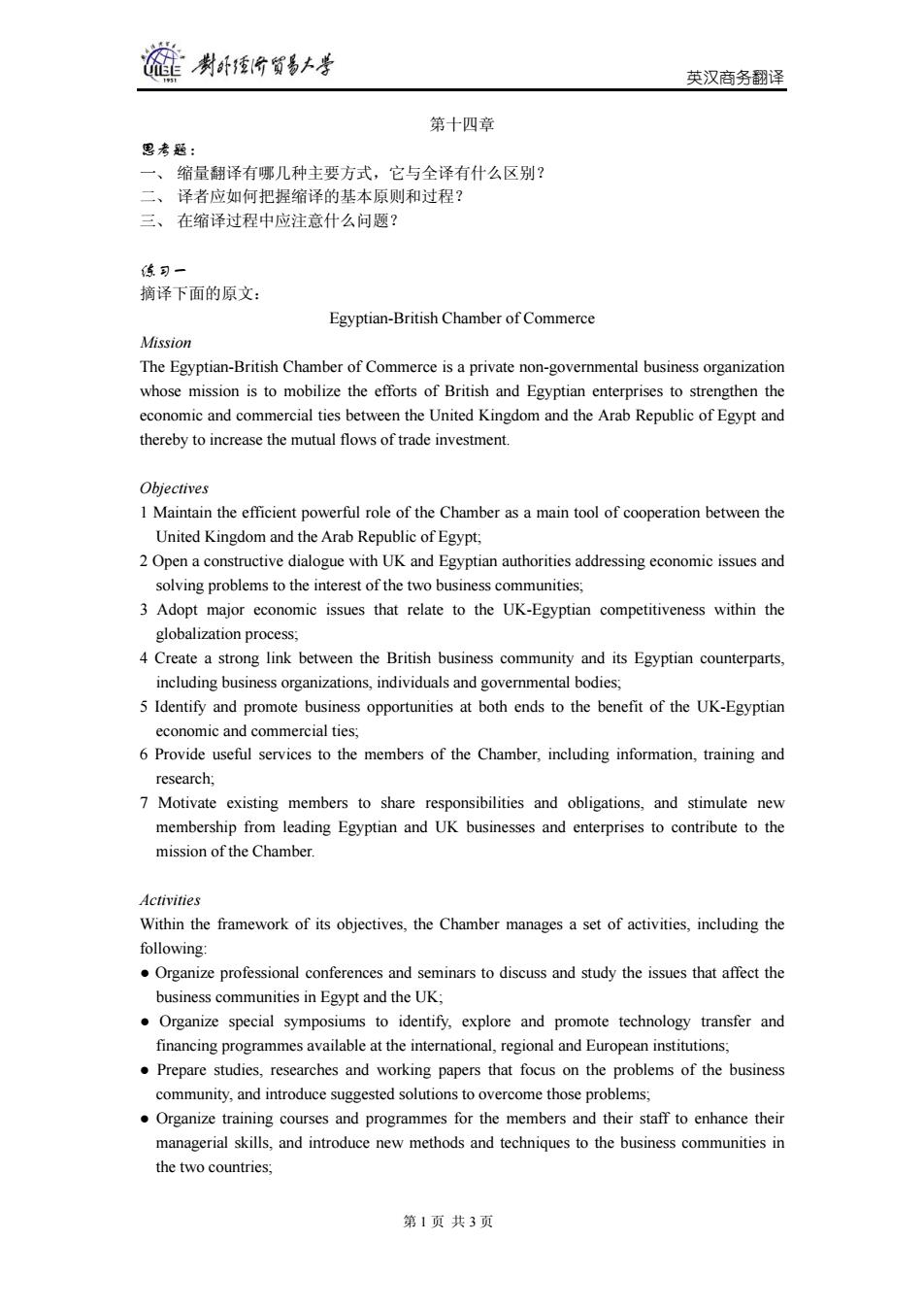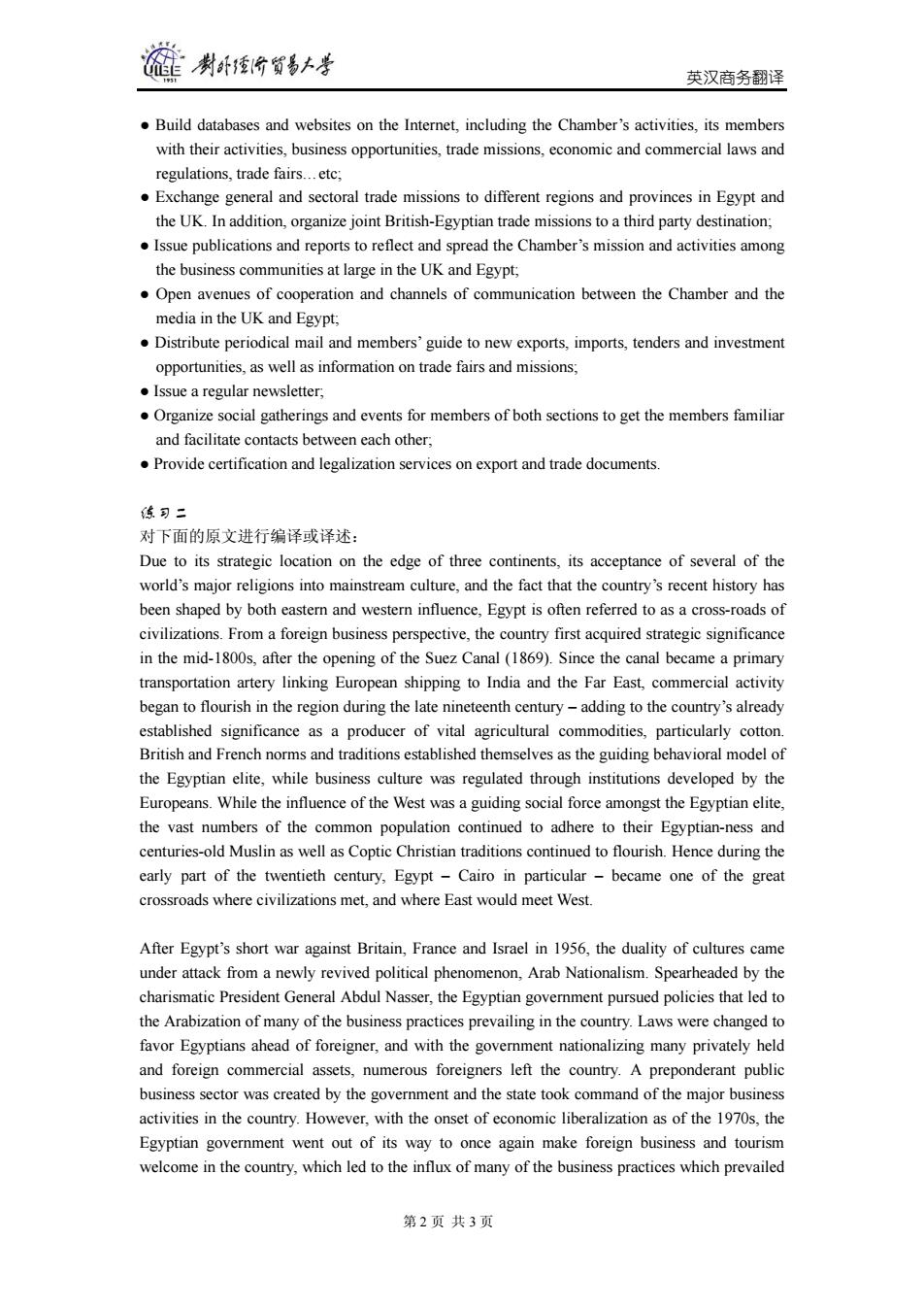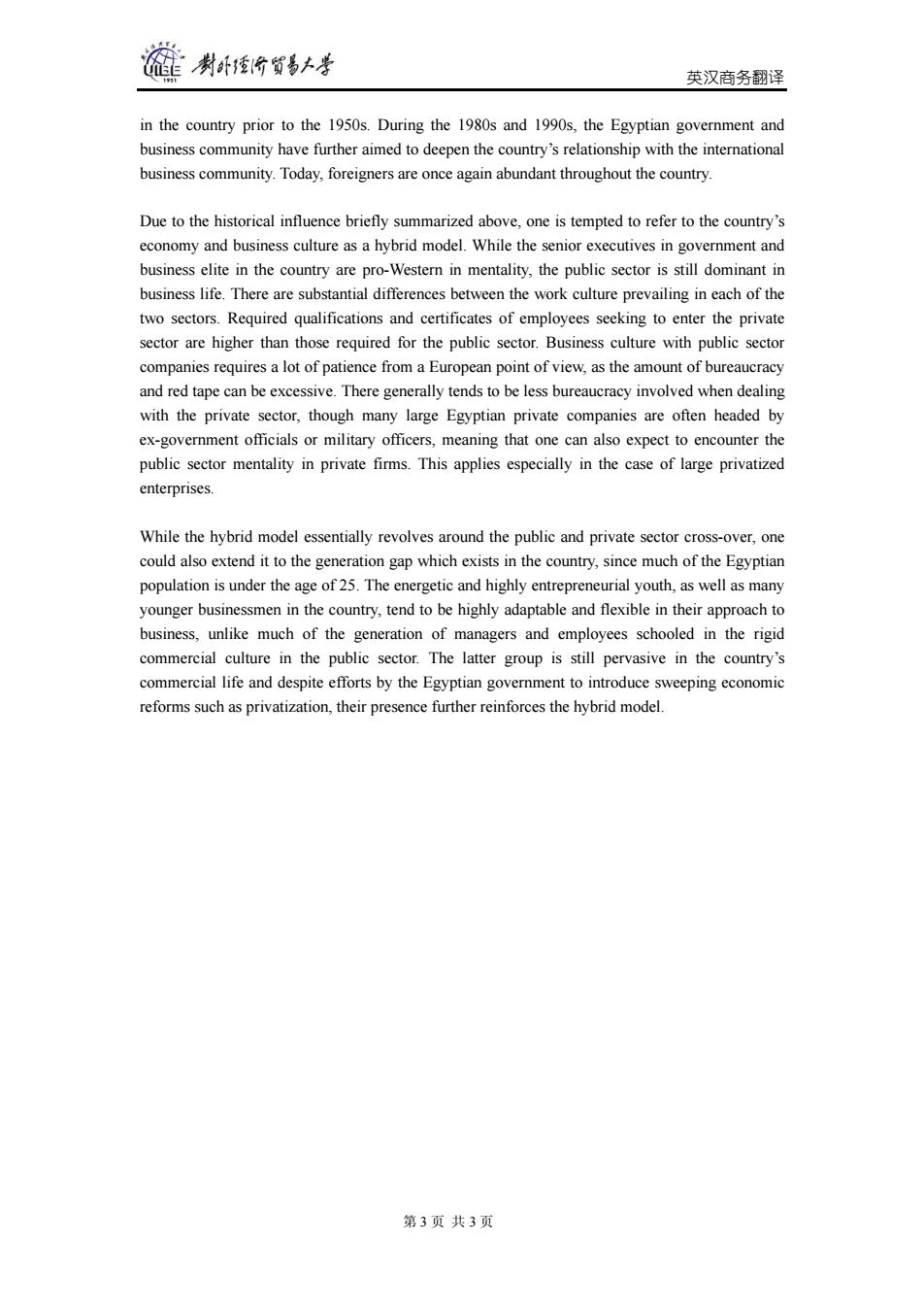
制卧所贸多本考 英汉商务翻译 第十四章 思考题: 一、 缩量翻译有哪几种主要方式,它与全译有什么区别? 二、 译者应如何把握缩译的基本原则和过程? 三、在缩译过程中应注意什么问题? 练习一 摘译下面的原文: Egyptian-British Chamber of Commerce Mission The Egyptian-British Chamber of Commerce is a private non-governmental business organization whose mission is to mobilize the efforts of British and Egyptian enterprises to strengthen the economic and commercial ties between the United Kingdom and the Arab Republic of Egypt and thereby to increase the mutual flows of trade investment. Objectives 1 Maintain the efficient powerful role of the Chamber as a main tool of cooperation between the United Kingdom and the Arab Republic of Egypt; 2 Open a constructive dialogue with UK and Egyptian authorities addressing economic issues and solving problems to the interest of the two business communities; 3 Adopt major economic issues that relate to the UK-Egyptian competitiveness within the globalization process; 4 Create a strong link between the British business community and its Egyptian counterparts, including business organizations,individuals and governmental bodies; 5 Identify and promote business opportunities at both ends to the benefit of the UK-Egyptian economic and commercial ties; 6 Provide useful services to the members of the Chamber,including information,training and research: 7 Motivate existing members to share responsibilities and obligations,and stimulate new membership from leading Egyptian and UK businesses and enterprises to contribute to the mission of the Chamber. Activities Within the framework of its objectives,the Chamber manages a set of activities,including the following: .Organize professional conferences and seminars to discuss and study the issues that affect the business communities in Egypt and the UK; Organize special symposiums to identify,explore and promote technology transfer and financing programmes available at the international,regional and European institutions; Prepare studies,researches and working papers that focus on the problems of the business community,and introduce suggested solutions to overcome those problems; .Organize training courses and programmes for the members and their staff to enhance their managerial skills,and introduce new methods and techniques to the business communities in the two countries: 第1页共3页
英汉商务翻译 第十四章 思考题: 一、 缩量翻译有哪几种主要方式,它与全译有什么区别? 二、 译者应如何把握缩译的基本原则和过程? 三、 在缩译过程中应注意什么问题? 练习一 摘译下面的原文: Egyptian-British Chamber of Commerce Mission The Egyptian-British Chamber of Commerce is a private non-governmental business organization whose mission is to mobilize the efforts of British and Egyptian enterprises to strengthen the economic and commercial ties between the United Kingdom and the Arab Republic of Egypt and thereby to increase the mutual flows of trade investment. Objectives 1 Maintain the efficient powerful role of the Chamber as a main tool of cooperation between the United Kingdom and the Arab Republic of Egypt; 2 Open a constructive dialogue with UK and Egyptian authorities addressing economic issues and solving problems to the interest of the two business communities; 3 Adopt major economic issues that relate to the UK-Egyptian competitiveness within the globalization process; 4 Create a strong link between the British business community and its Egyptian counterparts, including business organizations, individuals and governmental bodies; 5 Identify and promote business opportunities at both ends to the benefit of the UK-Egyptian economic and commercial ties; 6 Provide useful services to the members of the Chamber, including information, training and research; 7 Motivate existing members to share responsibilities and obligations, and stimulate new membership from leading Egyptian and UK businesses and enterprises to contribute to the mission of the Chamber. Activities Within the framework of its objectives, the Chamber manages a set of activities, including the following: ● Organize professional conferences and seminars to discuss and study the issues that affect the business communities in Egypt and the UK; ● Organize special symposiums to identify, explore and promote technology transfer and financing programmes available at the international, regional and European institutions; ● Prepare studies, researches and working papers that focus on the problems of the business community, and introduce suggested solutions to overcome those problems; ● Organize training courses and programmes for the members and their staff to enhance their managerial skills, and introduce new methods and techniques to the business communities in the two countries; 第 1 页 共 3 页

制卧爱分贸易本考 英汉商务翻译 Build databases and websites on the Internet,including the Chamber's activities,its members with their activities,business opportunities,trade missions,economic and commercial laws and regulations,trade fairs...etc: Exchange general and sectoral trade missions to different regions and provinces in Egypt and the UK.In addition,organize joint British-Egyptian trade missions to a third party destination; Issue publications and reports to reflect and spread the Chamber's mission and activities among the business communities at large in the UK and Egypt; Open avenues of cooperation and channels of communication between the Chamber and the media in the UK and Egypt; Distribute periodical mail and members'guide to new exports,imports,tenders and investment opportunities,as well as information on trade fairs and missions; Issue a regular newsletter; Organize social gatherings and events for members of both sections to get the members familiar and facilitate contacts between each other; Provide certification and legalization services on export and trade documents. 练习二 对下面的原文进行编译或译述: Due to its strategic location on the edge of three continents,its acceptance of several of the world's major religions into mainstream culture,and the fact that the country's recent history has been shaped by both eastern and western influence,Egypt is often referred to as a cross-roads of civilizations.From a foreign business perspective,the country first acquired strategic significance in the mid-1800s,after the opening of the Suez Canal(1869).Since the canal became a primary transportation artery linking European shipping to India and the Far East,commercial activity began to flourish in the region during the late nineteenth century-adding to the country's already established significance as a producer of vital agricultural commodities,particularly cotton. British and French norms and traditions established themselves as the guiding behavioral model of the Egyptian elite,while business culture was regulated through institutions developed by the Europeans.While the influence of the West was a guiding social force amongst the Egyptian elite, the vast numbers of the common population continued to adhere to their Egyptian-ness and centuries-old Muslin as well as Coptic Christian traditions continued to flourish.Hence during the early part of the twentieth century,Egypt-Cairo in particular-became one of the great crossroads where civilizations met,and where East would meet West. After Egypt's short war against Britain,France and Israel in 1956,the duality of cultures came under attack from a newly revived political phenomenon,Arab Nationalism.Spearheaded by the charismatic President General Abdul Nasser,the Egyptian government pursued policies that led to the Arabization of many of the business practices prevailing in the country.Laws were changed to favor Egyptians ahead of foreigner,and with the government nationalizing many privately held and foreign commercial assets,numerous foreigners left the country.A preponderant public business sector was created by the government and the state took command of the major business activities in the country.However,with the onset of economic liberalization as of the 1970s,the Egyptian government went out of its way to once again make foreign business and tourism welcome in the country,which led to the influx of many of the business practices which prevailed 第2页共3页
英汉商务翻译 ● Build databases and websites on the Internet, including the Chamber’s activities, its members with their activities, business opportunities, trade missions, economic and commercial laws and regulations, trade fairs…etc; ● Exchange general and sectoral trade missions to different regions and provinces in Egypt and the UK. In addition, organize joint British-Egyptian trade missions to a third party destination; ● Issue publications and reports to reflect and spread the Chamber’s mission and activities among the business communities at large in the UK and Egypt; ● Open avenues of cooperation and channels of communication between the Chamber and the media in the UK and Egypt; ● Distribute periodical mail and members’ guide to new exports, imports, tenders and investment opportunities, as well as information on trade fairs and missions; ● Issue a regular newsletter; ● Organize social gatherings and events for members of both sections to get the members familiar and facilitate contacts between each other; ● Provide certification and legalization services on export and trade documents. 练习二 对下面的原文进行编译或译述: Due to its strategic location on the edge of three continents, its acceptance of several of the world’s major religions into mainstream culture, and the fact that the country’s recent history has been shaped by both eastern and western influence, Egypt is often referred to as a cross-roads of civilizations. From a foreign business perspective, the country first acquired strategic significance in the mid-1800s, after the opening of the Suez Canal (1869). Since the canal became a primary transportation artery linking European shipping to India and the Far East, commercial activity began to flourish in the region during the late nineteenth century – adding to the country’s already established significance as a producer of vital agricultural commodities, particularly cotton. British and French norms and traditions established themselves as the guiding behavioral model of the Egyptian elite, while business culture was regulated through institutions developed by the Europeans. While the influence of the West was a guiding social force amongst the Egyptian elite, the vast numbers of the common population continued to adhere to their Egyptian-ness and centuries-old Muslin as well as Coptic Christian traditions continued to flourish. Hence during the early part of the twentieth century, Egypt – Cairo in particular – became one of the great crossroads where civilizations met, and where East would meet West. After Egypt’s short war against Britain, France and Israel in 1956, the duality of cultures came under attack from a newly revived political phenomenon, Arab Nationalism. Spearheaded by the charismatic President General Abdul Nasser, the Egyptian government pursued policies that led to the Arabization of many of the business practices prevailing in the country. Laws were changed to favor Egyptians ahead of foreigner, and with the government nationalizing many privately held and foreign commercial assets, numerous foreigners left the country. A preponderant public business sector was created by the government and the state took command of the major business activities in the country. However, with the onset of economic liberalization as of the 1970s, the Egyptian government went out of its way to once again make foreign business and tourism welcome in the country, which led to the influx of many of the business practices which prevailed 第 2 页 共 3 页

制卧爱分贸易+学 英汉商务翻译 in the country prior to the 1950s.During the 1980s and 1990s,the Egyptian government and business community have further aimed to deepen the country's relationship with the international business community.Today,foreigners are once again abundant throughout the country. Due to the historical influence briefly summarized above,one is tempted to refer to the country's economy and business culture as a hybrid model.While the senior executives in government and business elite in the country are pro-Western in mentality,the public sector is still dominant in business life.There are substantial differences between the work culture prevailing in each of the two sectors.Required qualifications and certificates of employees seeking to enter the private sector are higher than those required for the public sector.Business culture with public sector companies requires a lot of patience from a European point of view,as the amount of bureaucracy and red tape can be excessive.There generally tends to be less bureaucracy involved when dealing with the private sector,though many large Egyptian private companies are often headed by ex-government officials or military officers,meaning that one can also expect to encounter the public sector mentality in private firms.This applies especially in the case of large privatized enterprises. While the hybrid model essentially revolves around the public and private sector cross-over,one could also extend it to the generation gap which exists in the country,since much of the Egyptian population is under the age of 25.The energetic and highly entrepreneurial youth,as well as many younger businessmen in the country,tend to be highly adaptable and flexible in their approach to business,unlike much of the generation of managers and employees schooled in the rigid commercial culture in the public sector.The latter group is still pervasive in the country's commercial life and despite efforts by the Egyptian government to introduce sweeping economic reforms such as privatization,their presence further reinforces the hybrid model. 第3页共3页
英汉商务翻译 in the country prior to the 1950s. During the 1980s and 1990s, the Egyptian government and business community have further aimed to deepen the country’s relationship with the international business community. Today, foreigners are once again abundant throughout the country. Due to the historical influence briefly summarized above, one is tempted to refer to the country’s economy and business culture as a hybrid model. While the senior executives in government and business elite in the country are pro-Western in mentality, the public sector is still dominant in business life. There are substantial differences between the work culture prevailing in each of the two sectors. Required qualifications and certificates of employees seeking to enter the private sector are higher than those required for the public sector. Business culture with public sector companies requires a lot of patience from a European point of view, as the amount of bureaucracy and red tape can be excessive. There generally tends to be less bureaucracy involved when dealing with the private sector, though many large Egyptian private companies are often headed by ex-government officials or military officers, meaning that one can also expect to encounter the public sector mentality in private firms. This applies especially in the case of large privatized enterprises. While the hybrid model essentially revolves around the public and private sector cross-over, one could also extend it to the generation gap which exists in the country, since much of the Egyptian population is under the age of 25. The energetic and highly entrepreneurial youth, as well as many younger businessmen in the country, tend to be highly adaptable and flexible in their approach to business, unlike much of the generation of managers and employees schooled in the rigid commercial culture in the public sector. The latter group is still pervasive in the country’s commercial life and despite efforts by the Egyptian government to introduce sweeping economic reforms such as privatization, their presence further reinforces the hybrid model. 第 3 页 共 3 页